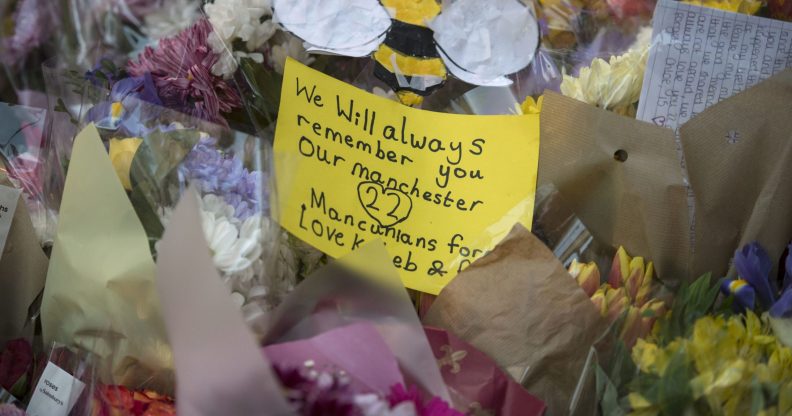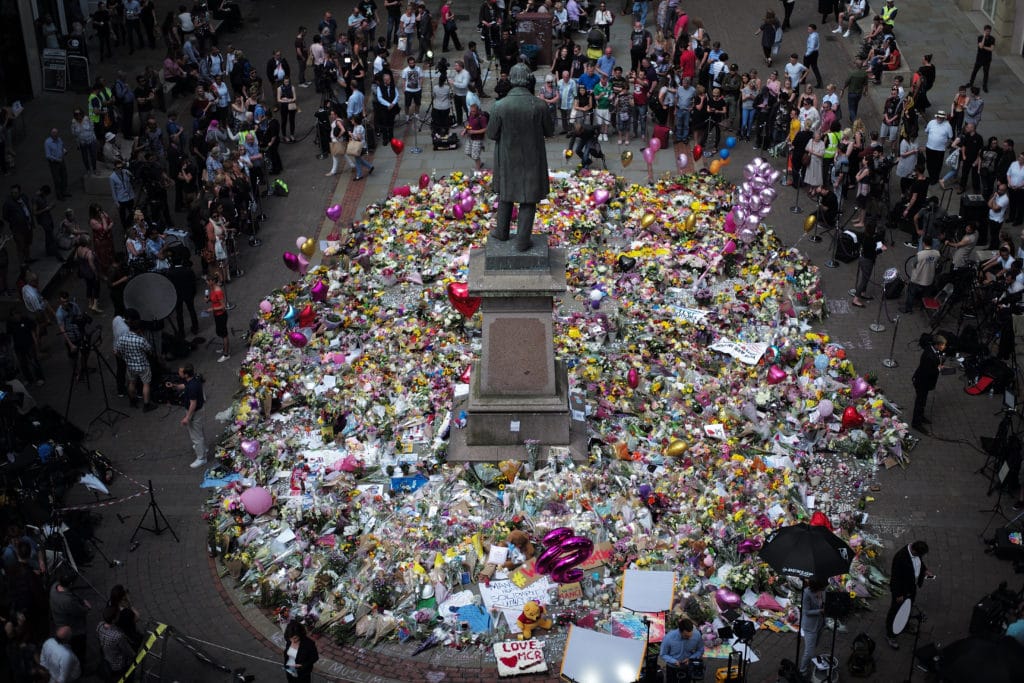Manchester Arena bombing inquiry says lives could have been saved if not for ‘serious shortcomings’

Flowers and messages of condolence are left in central Manchester, May 22, 2018, marking the one year anniversary of the deadly attack at Manchester Arena. (OLI SCARFF / AFP via Getty Images)
The “devastation” of the Manchester Arena bombing could have been minimised and lives saved were it not for “serious shortcomings”, a major inquiry published Thursday (17 June) found.
Judge John Saunders, chair of the inquiry into the terror attack, found that a raft of security “shortcomings” resulted in “missed opportunities” before Salman Abedi set of a bomb at the end of an Ariana Grande concert in 2017.
It was “highly likely”, the report said, that Abedi would have still detonated the bomb. However, lives could have been saved.
On 22 May, 2017, Abedi discharged a vest laden with explosives, killing 22 people including children, teenagers and parents waiting to pick them up from the concert. More than 234 people were injured in what became one of Britain’s worst terrorist attacks in recent memory.
“The security arrangements for the Manchester Arena should have prevented or minimised the devastating impact of the attack,” Saunders wrote in the 196-page report, the first of three volumes of the inquiry.
“They failed to do so,” he said, before adding: “The loss of life and injury is highly likely to have been less.”
Despite these shortcomings, Saunders said the “responsibility” of the incident lies squarely with Abedi and his brother, Hashem, who was jailed for life for his involvement.
What did the Manchester Arena bombing inquiry find?
In his report, Saunders took aim at the arena’s operator, SMG Europe, security company Showsec and the British Transport Police. The three were “principally responsible for the missed opportunities”, he said, but there were also “failings by individuals”.
He stressed that gig-goer Christopher Wild had flagged Abedi to a security guard. But instead of taking his concerns seriously, the guard simply “fobbed [Wild] off”.
The damning inquiry, launched in 2019 by home secretary Priti Patel, identified a slew of mishaps and muddled security measures that, if remedied, could have changed the course of events that evening.
Among the litany of “missed opportunities” was how one security guard, Kyle Lawler, attempted to alert the security control room about Abedi, only for his calls to not get through. He then left the foyer he was in at the time “unconcerned”.

The carpet of floral tributes to the victims and injured of the Manchester Arena bombing. (Christopher Furlong/Getty Images)
Saunders trained attention on SMG Europe’s “inadequate” CCTV system which he described as being poked with holes. There was, for one, a blind spot that allowed Abedi to hide for an hour in the arena.
If the operator had “paid greater attention to the threat level” the “devastation” of the evening could have been minimised.
Showsec, Saunders said, did not set out an “adequate security patrol” in the foyer for some 30 minutes – all the while as Abedi was in hiding.
Moreover, the company was said to have “failed to adequately train” the guard first alerted to the bomber in counter-terrorism protocol.
British Transport Police officers were not in the foyer at the time of the attack.
A “competent BTP officer would have taken action that could have saved lives”, Saunders said.
However, officers had gone on a five-mile kebab trip during their breaks after ignoring briefings.
The next volume of the report, to be released in the coming months, will focus on the “bravery” and “heroism” spurred during the night from members of the public and first responders.
Together with the names of the 22 who died,” Saunders wrote, “the very best of humanity shown that night by so many people should never be forgotten.”

